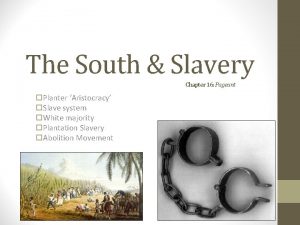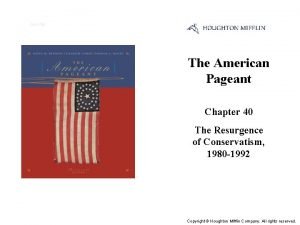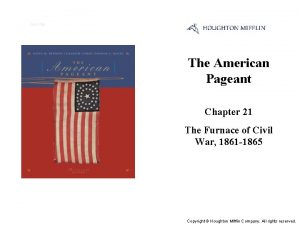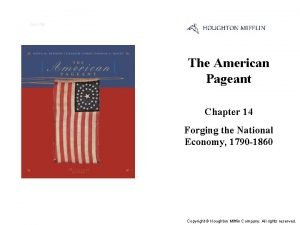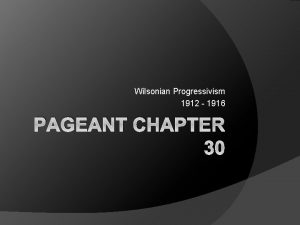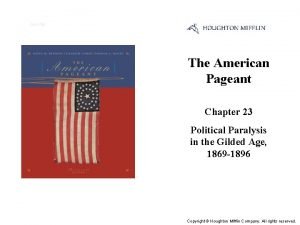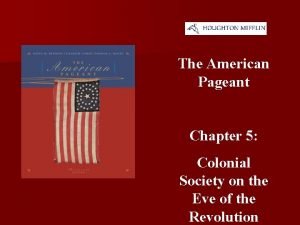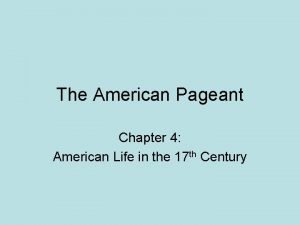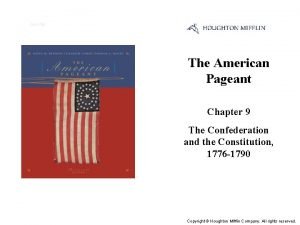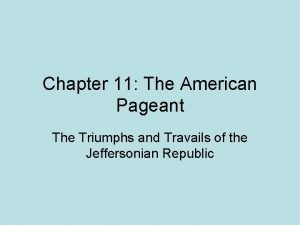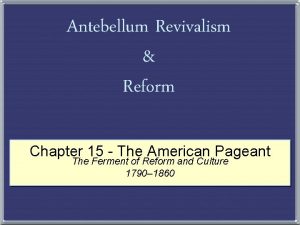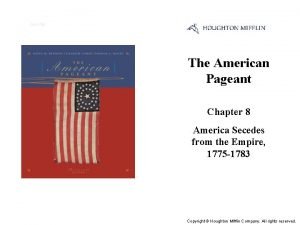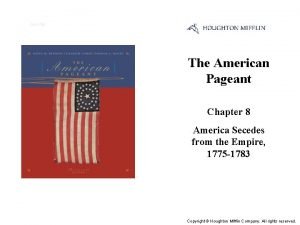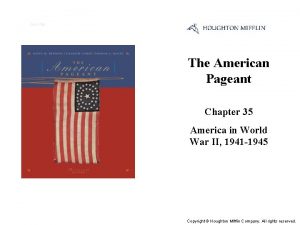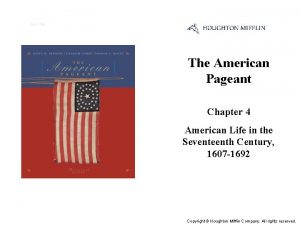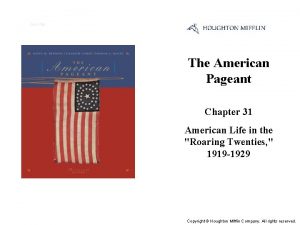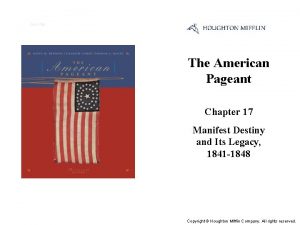Cover Slide The American Pageant Chapter 8 America













- Slides: 13

Cover Slide The American Pageant Chapter 8 America Secedes from the Empire, 1775 -1783 Copyright © Houghton Mifflin Company. All rights reserved.

Battle of Princeton by James Peale At the Battle of Princeton in early 1777, American forces under George Washington cemented the victory they had won a few days earlier at Trenton. This view was painted in 1787 by James Peale, who fought in the battle. (Princeton University Library) Copyright © Houghton Mifflin Company. All rights reserved.

Eighteenth-century British military kettledrum, surrendered at Saratoga This kettledrum belonged to the band of the Royal Norfolk Regiment, a British infantry unit that surrendered to the Americans at Saratoga. The drum was sent to West Point, where it has remained ever since, a symbol of the new nation's first great victory of the Revolution. (The West Point Museum Collection, U. S. Military Academy, West Point, New York. Photo by Paul Warchal. ) Copyright © Houghton Mifflin Company. All rights reserved.

Eighteenth-century medicine chest Measles, typhus, diphtheria, dysentery, and other diseases ravaged military encampments, making medicine chests like the one shown here essential equipment for the army. Doctors used crude remedies that often did more harm than good, for little was known about the causes of such afflictions. Smallpox was one of the few epidemics that eighteenth-century doctors could combat; inoculation was known to be an effective preventive measure as early as the 1720 s. (The West Point Museum Collection, U. S. Military Academy, West Point, New York. Photo by Josh Nefsky. ) Copyright © Houghton Mifflin Company. All rights reserved.

George III by A. Ramsay, 1767 Although unsure of himself and emotionally little more than a boy upon his accession to the English throne, George III possessed a deep moral sense and a fierce determination to rule as well as to reign. (Indianapolis Musum of Art, The James E. Roberts Fund) Copyright © Houghton Mifflin Company. All rights reserved.

George Washington's copy of Common Sense That America's patriot leaders read Thomas Paine's inflammatory Common Sense soon after it was published in early 1776 is indicated by this first edition, owned by George Washington himself. (Boston Athenaeum) Copyright © Houghton Mifflin Company. All rights reserved.

Joseph Brant by Charles Willson Peale, 1797 Joseph Brant, the Iroquois leader who helped to persuade the Mohawks, Senecas, and Cayugas to support the British in the latter stages of the Revolution, as painted by Charles Willson Peale in 1797. (Independence National Historic Park Collection) Copyright © Houghton Mifflin Company. All rights reserved.

New Touch on the Times… By a Daughter of Liberty Living in Marblehead, 1779 Americans on the home front as well as in the front lines experienced crippling wartime hardships. This illustration of a female partisan holding a musket accompanied a poem by Molly Gutridge, whose theme was women's sacrifice and suffering in a seaport economy upset by war. (© Collection of the New York Historical Society) Copyright © Houghton Mifflin Company. All rights reserved.

Surrender of the British at Yorktown French naval power combined with American military savvy to produce the decisive defeat of the British. (Library of Congress) Copyright © Houghton Mifflin Company. All rights reserved.

Tarleton's Cavalrymen After the Battle of Cowpens 1781, by William Ranney In this painting patriots stand their ground against cavalrymen led by Lieutenant Banastre Tarleton in a 1781 skirmish near Cowpens. As the painting shows, black as well as white Americans supported the revolutionary cause in the South. (Collection of the State of South Carolina. Photo by Hunter Clarkson, Alt Lee, Inc. ) Copyright © Houghton Mifflin Company. All rights reserved.

The Flutist, Barzillai Lew, African American fifer and drummer Barzillai Lew, a free African American born in Groton, Massachusetts, in 1743, served in the Seven Years War before enlisting with patriot troops in the American Revolution. An accomplished fifer, Lew fought at the Battle of Bunker Hill. Like other freemen in the north, he cast his lot with the revolutionaries, in contrast to southern bondspeople, who tended to favor the British. (Courtesy of Mae Theresa Bonitto) Copyright © Houghton Mifflin Company. All rights reserved.

Thomas Paine Having arrived in the colonies less than two years earlier, Paine became a bestselling author with the publication of Common Sense in 1776. (Art Gallery, Williams Center, Lafayette College ) Copyright © Houghton Mifflin Company. All rights reserved.

Washington and Lafayette at Winter Quarters shows the commander and his friend, the young aristocrat from France, sharing a moment of conversation while soldiers huddle together around a fire at Valley Forge. While British officers enjoyed the social life of Philadelphia, General Washington, his officers, and his men suffered from inadequate food, supplies, firewood, and shelter in their winter encampment, a situation due, in part, to the corruption and greed of military suppliers and the incompetence of the quartermaster corps. (Stock Montage ) Copyright © Houghton Mifflin Company. All rights reserved.
 American pageant chapter 16
American pageant chapter 16 American pageant chapter 35
American pageant chapter 35 Chapter 40 american pageant
Chapter 40 american pageant American pagent chapter 21
American pagent chapter 21 Chapter 14 american pageant
Chapter 14 american pageant American pageant chapter 13
American pageant chapter 13 The american pageant chapter 30
The american pageant chapter 30 Chapter 23 american pageant
Chapter 23 american pageant American pageant chapter 34
American pageant chapter 34 Chapter 5 american pageant
Chapter 5 american pageant Chapter 4 the american pageant
Chapter 4 the american pageant Chapter 9 the american pageant
Chapter 9 the american pageant American pageant chapter 11
American pageant chapter 11 American pageant chapter 15
American pageant chapter 15
